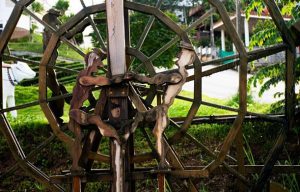Edwards v Bairstow and Harrison
[1955]
The appellate court generally recognises the special position of the Special Commissioners appointed under s. 98 of the Income Tax Act 1967.
The Special Commissioners are expected to be specialised in the scope of the adjudication process they are entrusted with under the Act.
If the High Court could not assail the facts found by the Special Commissioners and if the High Court attempts to do so, it necessarily must take cognisance of the strict test laid down in Chua Lip Kong which referred to the case of Edwards v. Bairstow.
Edwards v. Bairstow and Harrison [1955] is considered the leading case on the roles of the Tribunal and the courts in situations when conclusions of fact are in dispute.

This appeal relates to certain assessments for income tax made upon the Respondents, Harold Bairstow and Fred Harrison, for the years of assessment ending respectively the 5th April 1947, and the 5th April 1948, in respect of the profits made by them from sales of machinery.
The assessments had originally been made on Respondent Harold Bairstow only.
Still, it became common ground that the operations out of which the profits arose were the joint venture of both Respondents, and the case has throughout been argued upon the footing of the assessments being made in their joint names.
Mr. Harrison became aware in 1946 that a Complete Spinning plant was for sale at Messrs. Whitworths at Luddenden Foot and had reason to believe that the plant could be purchased for a reasonable figure.

He communicated this information to Mr. Bairstow as he was not in a position to finance any purchase.
Mr. Bairstow expressed his interest, but he and Harrison agreed that they had no intention of holding the plant—what they desired was a quick purchase and resale.
Mr. Bairstow, therefore, arranged for a valuation to be made by a professional valuer so that he might be satisfied that the price asked by Whitworths was one on which he could make a quick profit.
He also immediately and, before purchasing the plant, enquired whether he could arrange to sell the plant even before it had been purchased.
Mr. Harrison was in touch with an Indian by the name Wattal who was very anxious to purchase some of the plant, namely, the Botany Spinning section; for this, he was prepared to pay £17,000, but both Harrison and Bairstow were quite decided that they had no intention of selling the plant piece-meal; they wanted to sell it as a complete unit.
Then Mr. Bairstow began negotiations with the International Export Company.
They said they were prepared to buy the whole of the plant.

On the 14th of November, the International Export Company wrote to Mr. Bairstow saying that they were prepared to buy the plant which was on the fourth floor which was the Botany Spinning plant, for £15,000 this, of course, being £2,000 less than the price offered for the same section of the plant by the Indian Wattal.
The reason why the International Export Company were prepared to pay £15,000 immediately for that particular section of the plant was that although they were willing to purchase the whole of the plant, they intended to export it and whilst they were confident that an Import Licence into China would be forthcoming for the asking in respect of the botany spinning section they were not willing to complete the purchase of the remainder of the plant until the Import Licences for such remainder were forthcoming.

On the 20th of November, Mr. Bairstow, on behalf of himself and Harrison, having negotiated the purchase of the spinning plant and two small items of warping plant, completed the purchase by the payment to Whitworths of £12,000.
On the 27th of November, one week later, the International Export Company paid Mr. Bairstow the sum of £15,000 for the botany spinning plant.
Subsequently, the International Export Company informed Messrs. Bairstow and Harrison that, unfortunately, the Import Licences relating to the remainder of the plant could not be obtained.
Therefore it was regretted that they could not purchase the remainder of the plant.
Thus Mr. Bairstow and Mr. Hanison found themselves with the remainder of the plant on their hands (which they had endeavoured to avoid), and this left them no alternative but to sell that remainder in whatever market they could.

The rest of the plant was sold in two other principal and two smaller lots by February 1948 though owing to difficulties, the last plant was not removed until March 1949.
The two smaller lots consisted of the two items of warping plant.
Mr. Bairstow was a Director of a company manufacturing leather.
Mr. Harrison was an employee of a spinning firm.
Neither had had any transactions in machinery or other commodities before.
The tax inspector claimed that the deal was an ‘adventure or concern in the nature of trade’ and that Mr. Bairstow was liable for tax.
Against these assessments, which were in the sum of £10,326 for the first year and £5,000 for the second year, appeals were taken to the Commissioners for the General Purposes of the Income Tax for the Division of West Morley in the County of York.
The Commissioners (the predecessors of the First-tier Tribunal) had found that there was an isolated transaction and that it was not an adventure in the nature of trade.
The Appellant, having expressed his dissatisfaction with their decision as being erroneous in point of law, stated a Case for the opinion of the High Court.
In the High Court and Court of Appeal, the decision of the tax commissioners were affirmed

The House was asked whether a particular transaction was ‘an adventure in the nature of trade’.
The Appellant contended that the buying and selling of the plant constituted a trade or adventure in the nature of trade and that the profits and gains arising therefrom were assessable accordingly.
The Commissioners expressed their original determination in these terms: ”We, the Commissioners, having considered the facts and evidence submitted to us, are of the opinion that this was an isolated case and not ”taxable and discharge the assessments “.
The judgements in the House of Lords discuss the extent to which the courts (or the Upper Tribunal) can properly interfere in a decision of the Commissioners or First-tier Tribunal.
Although the House accepted that this was ‘an inference of fact’, on the primary facts as found by the Commissioners, ‘the true and only reasonable conclusion’ contradicted that decision.
The House set out principles for establishing that the decisions of a commissioner were ones of law and were reviewable by an appellate court.
Lord Radcliffe said:

I think that the true position of the Court in all these cases can be shortly stated.
If a party to a hearing before Commissioners expresses dissatisfaction with their determination as being erroneous in point of law, it is for them to state a case and, in the body of it, to set out the facts that they have found as well as their determination.
I do not think that inferences drawn from other facts are incapable of being themselves findings of fact, although there is value in the distinction between primary facts and inferences drawn from them.
When the case comes before the Court, it is its duty to examine the determination having regard to its knowledge of the relevant law.
Viscount Simonds said: Distinction between law and fact
- Whether the transaction was an ‘adventure or concern in the nature of trade’ is ‘no more than an inference from the facts previously found’, provided that the tribunal is rightly directed in law on what the characteristics of an adventure in the nature of trade: p. 30 – 31
- ‘It is a question of law what is murder: a jury finding as a fact that murder has been committed has been directed on the law and acts under that direction.’
More specifically, the case is an example of the court finding that the primary facts all pointed one way, and the Commissioners’ conclusion pointed the other.
Held (House of Lords)
It was held in the House of Lords that the only reasonable conclusion on the evidence before the Commissioners was that the transaction was an adventure in the nature of trade.
- Appeal allowed
- The decision of the tax commissioners was set aside as it could not be justified by the facts
What does it mean
Although it is a general rule that the finding of primary facts by the Special Commissioners of Income Tax (SCIT) is unassailable, and can be neither overruled nor supplemented by the High Court itself, the exception is when there was no evidence on which the findings could be founded, or if it could be shown that it was a finding of fact which no reasonable person could arrive at.

Our website's articles, templates, and material are solely for reference. Although we make every effort to keep the information up to date and accurate, we make no representations or warranties of any kind, either express or implied, regarding the website or the information, articles, templates, or related graphics that are contained on the website in terms of its completeness, accuracy, reliability, suitability, or availability. Therefore, any reliance on such information is strictly at your own risk.
Keep in touch with us so that you can receive timely updates |
要获得即时更新,请与我们保持联系
1. Website ✍️ https://www.ccs-co.com/ 2. Telegram ✍️ http://bit.ly/YourAuditor 3. Facebook ✍
- https://www.facebook.com/YourHRAdvisory/?ref=pages_you_manage
- https://www.facebook.com/YourAuditor/?ref=pages_you_manage
4. Blog ✍ https://lnkd.in/e-Pu8_G 5. Google ✍ https://lnkd.in/ehZE6mxy
6. LinkedIn ✍ https://www.linkedin.com/company/74734209/admin/






